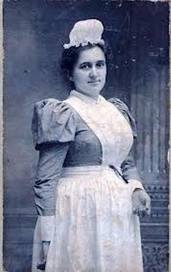
The Rescuer of 5000 Orphans
Sara Corning
Sara Corning was born in Chegoggin City, in 1872, eight kilometers north of Yarmouth (south-eastern Canada). She joined the American Red Cross during the First World War (1914-1918) and left for the Ottoman Empire as a volunteer to assist the Armenian refugees and orphans rescued from the Turkish massacres. In those days the Canadian media (Toronto World, The Halifax Herald, La Presse and etc.) largely covered the Armenian massacres to make the public aware of the problem. In 1922 Sara signed up for the Near East Relief and left for Smyrna.
In September 1922, the Kemalists invaded Smyrna, which was mainly populated by refugees. At that time, besides the local Armenians, thousands of Armenian refugees the large part of whom was orphans were in city. On September 13, the Kemalists set fire on “Gavur Izmir”, as a result of which, 100.000-150.000 Christian inhabitants were killed. Great panic was raised in the city: the Christians escaping from the fire were seeking shelter in the European and American consulates. The international humanitarian organizations like the Red Cross, the Near East Relief and etc., organized their evacuation to the sea.
Being in the very centre of the events, Sara Corning made superhuman efforts to gather over 5000 mostly female Armenians under 12, and Greek children in Smyrna. They were moved to Greece by American warships. Here she established an orphanage upbringing these pupils and educating them as true Christians.
In 1923, King George II of Greece officially invited her to the royal palace and awarded her with the medal of “Silver Cross of the Savior”, the highest state award in Greece. This award is generally given to Greek soldiers and civilians for their special services for the motherland and foreigners for their special services for Greece.
In 1924 Sara Corning left for Turkey where she worked as a teacher. Upon retirement, she returned to her native town, Chegoggin, where she lived until her death in 1969. She passed away at the age of 97 having devoted her life to children’s education and upbringing.
Some information concerning Sara Corning’s humanitarian activity is kept in the museum of Yarmouth and in the Cornings’ family archives.
Sara Corning
Sara Corning was born in Chegoggin City, in 1872, eight kilometers north of Yarmouth (south-eastern Canada). She joined the American Red Cross during the First World War (1914-1918) and left for the Ottoman Empire as a volunteer to assist the Armenian refugees and orphans rescued from the Turkish massacres. In those days the Canadian media (Toronto World, The Halifax Herald, La Presse and etc.) largely covered the Armenian massacres to make the public aware of the problem. In 1922 Sara signed up for the Near East Relief and left for Smyrna.
In September 1922, the Kemalists invaded Smyrna, which was mainly populated by refugees. At that time, besides the local Armenians, thousands of Armenian refugees the large part of whom was orphans were in city. On September 13, the Kemalists set fire on “Gavur Izmir”, as a result of which, 100.000-150.000 Christian inhabitants were killed. Great panic was raised in the city: the Christians escaping from the fire were seeking shelter in the European and American consulates. The international humanitarian organizations like the Red Cross, the Near East Relief and etc., organized their evacuation to the sea.
Being in the very centre of the events, Sara Corning made superhuman efforts to gather over 5000 mostly female Armenians under 12, and Greek children in Smyrna. They were moved to Greece by American warships. Here she established an orphanage upbringing these pupils and educating them as true Christians.
In 1923, King George II of Greece officially invited her to the royal palace and awarded her with the medal of “Silver Cross of the Savior”, the highest state award in Greece. This award is generally given to Greek soldiers and civilians for their special services for the motherland and foreigners for their special services for Greece.
In 1924 Sara Corning left for Turkey where she worked as a teacher. Upon retirement, she returned to her native town, Chegoggin, where she lived until her death in 1969. She passed away at the age of 97 having devoted her life to children’s education and upbringing.
Some information concerning Sara Corning’s humanitarian activity is kept in the museum of Yarmouth and in the Cornings’ family archives.
